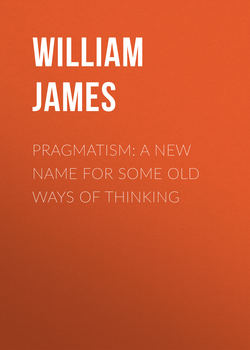Pragmatism: A New Name for Some Old Ways of Thinking

Реклама. ООО «ЛитРес», ИНН: 7719571260.
Оглавление
William James. Pragmatism: A New Name for Some Old Ways of Thinking
Preface
Lecture I. – The Present Dilemma in Philosophy
Lecture II. – What Pragmatism Means
Lecture III. – Some Metaphysical Problems Pragmatically Considered
Lecture IV. – The One and the Many
Lecture V. – Pragmatism and Common Sense
Lecture VI. – Pragmatism's Conception of Truth
Lecture VII. – Pragmatism and Humanism
Lecture VIII. – Pragmatism and Religion
Отрывок из книги
In the preface to that admirable collection of essays of his called 'Heretics,' Mr. Chesterton writes these words: "There are some people—and I am one of them—who think that the most practical and important thing about a man is still his view of the universe. We think that for a landlady considering a lodger, it is important to know his income, but still more important to know his philosophy. We think that for a general about to fight an enemy, it is important to know the enemy's numbers, but still more important to know the enemy's philosophy. We think the question is not whether the theory of the cosmos affects matters, but whether, in the long run, anything else affects them."
I think with Mr. Chesterton in this matter. I know that you, ladies and gentlemen, have a philosophy, each and all of you, and that the most interesting and important thing about you is the way in which it determines the perspective in your several worlds. You know the same of me. And yet I confess to a certain tremor at the audacity of the enterprise which I am about to begin. For the philosophy which is so important in each of us is not a technical matter; it is our more or less dumb sense of what life honestly and deeply means. It is only partly got from books; it is our individual way of just seeing and feeling the total push and pressure of the cosmos. I have no right to assume that many of you are students of the cosmos in the class-room sense, yet here I stand desirous of interesting you in a philosophy which to no small extent has to be technically treated. I wish to fill you with sympathy with a contemporaneous tendency in which I profoundly believe, and yet I have to talk like a professor to you who are not students. Whatever universe a professor believes in must at any rate be a universe that lends itself to lengthy discourse. A universe definable in two sentences is something for which the professorial intellect has no use. No faith in anything of that cheap kind! I have heard friends and colleagues try to popularize philosophy in this very hall, but they soon grew dry, and then technical, and the results were only partially encouraging. So my enterprise is a bold one. The founder of pragmatism himself recently gave a course of lectures at the Lowell Institute with that very word in its title-flashes of brilliant light relieved against Cimmerian darkness! None of us, I fancy, understood ALL that he said—yet here I stand, making a very similar venture.
.....
I wish that I had saved the first couple of pages of a thesis which a student handed me a year or two ago. They illustrated my point so clearly that I am sorry I cannot read them to you now. This young man, who was a graduate of some Western college, began by saying that he had always taken for granted that when you entered a philosophic class-room you had to open relations with a universe entirely distinct from the one you left behind you in the street. The two were supposed, he said, to have so little to do with each other, that you could not possibly occupy your mind with them at the same time. The world of concrete personal experiences to which the street belongs is multitudinous beyond imagination, tangled, muddy, painful and perplexed. The world to which your philosophy-professor introduces you is simple, clean and noble. The contradictions of real life are absent from it. Its architecture is classic. Principles of reason trace its outlines, logical necessities cement its parts. Purity and dignity are what it most expresses. It is a kind of marble temple shining on a hill.
In point of fact it is far less an account of this actual world than a clear addition built upon it, a classic sanctuary in which the rationalist fancy may take refuge from the intolerably confused and gothic character which mere facts present. It is no EXPLANATION of our concrete universe, it is another thing altogether, a substitute for it, a remedy, a way of escape.
.....